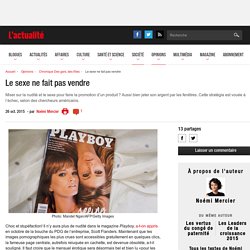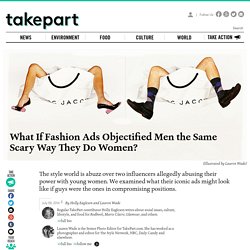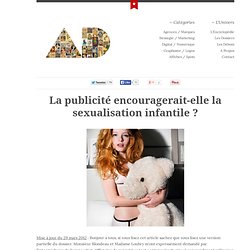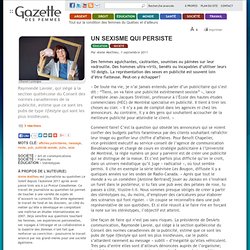

Le sexe ne fait pas vendre. Photo: Mandel Ngan/AFP/Getty Images Choc et stupéfaction!

Il n’y aura plus de nudité dans le magazine Playboy, a-t-on appris en octobre de la bouche du PDG de l’entreprise, Scott Flanders. Maintenant que les images pornographiques les plus crues sont accessibles gratuitement en quelques clics, la fameuse page centrale, autrefois reluquée en cachette, est devenue obsolète, a-t-il souligné. Il faut croire que le mensuel érotique sera désormais bel et bien lu «pour les articles». La tradition inaugurée en 1953 avec Marilyn Monroe prendra fin en mars prochain. C’est une décision d’affaires judicieuse que vient de prendre la multinationale au logo de lapin. What If Fashion Ads Objectified Men the Same Scary Way They Do Women? It’s been a rough few weeks for pervy middle-aged guys in the fashion industry.

First, photographer Terry Richardson was the subject of a much discussed New York magazine feature that questioned whether the lensman is an artist or a predator. The piece explored more than a decade of allegations of abusive behavior toward fledgling models, who told of Richardson asking them to perform graphic sex acts to further their careers.
Even high-profile models have long expressed disgust at Richardson’s methods. In 2010, supermodel Rie Rasmussen told Page Six, “He takes girls who are young, manipulates them to take their clothes off and takes pictures of them they will be ashamed of. They are too afraid to say no because their agency booked them on the job and are too young to stand up for themselves.” Meanwhile, on June 18, American Apparel CEO Dov Charney was unceremoniously dismissed from his position because of the A.A. board’s “ongoing investigation into alleged misconduct.” How to Be a Ladyperson at the Holidays: 10 Important Tips. Straight from the ad pages of your favorite magazines, here’s your guide to being a girl in December.

Take notes. 1. Stay cozy. Wear a baby. If you play your cards right, your sensitive, goateed dad/boyfriend/professor will reward you with a pair of socks made out of his extra sweater sleeves. 2. Show off all your many dimensions at once. 3. Projet Stéréotypes sexistes publicités. Does the Rise of Men’s Sexual Objectification = Equality? By Lisa Wade, PhD, Dec 12, 2013, at 08:00 am Recently David Gianatasio at AdWeek wrote an analysis of the sudden rise in the sexual objectification of men in advertising.

It seems to have been spurred by the wild popularity of the Old Spice character introduced in 2010, The Man Your Man Could Smell Like. Gianatasio calls it “hunkvertising.” Indeed, rippling abdominal muscles suddenly seem to be everywhere. Gianatasio interviewed me for the piece and I had two thoughts. Second, objectifying men alongside women certainly isn’t progress.
Dove Has A Beauty Problem. In April, I posted Dove’s Real Beauty campaign video on my Facebook with the caption, “You’re more beautiful than you think.”

At first glance, this video seemed comforting, almost therapeutic as an antidote against our airbrushed versions of beauty typified by Hollywood and glossy magazine covers. Instead of telling women to lose weight, apply makeup correctly and dress for our body shapes, Dove (which sells skin and hair-care products) reassured us that we are beautiful despite our self-confessed flaws. But there was something deeply distressing about the message behind this Dove ad: With soothing music playing in the background, the ad traces various women as they describe themselves to a former forensic artist. La publicité encouragerait-elle la sexualisation infantile ? Mise à jour du 29 mars 2012 : Bonjour à tous, si vous lisez cet article sachez que vous lisez une version partielle du dossier.

Monsieur Blondeau et Madame Loubry m'ont expressément demandé par l’intermédiaire de l'agence Net-Offensive de supprimer tout contenu (écrit, visuel, sonore) faisant référence à leur fille et en particulier à son shooting plus que douteux pour Vogue, alimentant une bonne partie de l'article. Les commentaires citant son nom seront aussi retirés.
Vous m'en voyez désolé, mais je n'ai pas le choix... L'article du jour est un article un peu particulier parce que particulièrement lié à un phénomène de société : la sexualisation infantile. A l'heure où la pédophilie est de plus en plus accusée et traquée, on peut se demander si au sein même de notre quotidien, on ne retrouve pas des traces pédo-pornographie évidentes. Des campagnes rares mais qui marquent leur temps 1974 "Parce que l'innocence est plus sexy que vous pouviez le penser" Women Are Animals Too, PETA. I love animals, but sometimes I really dislike PETA.

The organization has become more consumed with garnering publicity and money and doesn’t seem to care how much they offend people. (We’re animals too, you know?) The latest in what has been a long string of questionable ad campaigns by PETA features Dancing with the Stars‘ contestant, Playboy model and Real Housewives of Miami cast member Joanna Krupa.
Saturday Vids: Reversing Gender Roles in Ads. Pop-Culture | Posted by Julie Z on 04/13/2013 I recently got an email from Dylan Lambi-Raine, who wrote: “I’m a feminista, Genders Studies and Social Work student.

I live in Saskatoon, Saskatchewan and am interested in sharing a video that a group (Kayla Hatzel and Sarah Zelinski) and myself made. We were hoping to show the ridiculousness of gender stereotypes and tropes in advertising through switching gender roles in the images.” I think their idea to reverse roles in sexist and sometimes violent ads is really thought-provoking. Check it out and share your thoughts! Un sexisme qui persiste.
Des femmes aguichantes, castrantes, soumises ou pâmées sur leur vadrouille.
